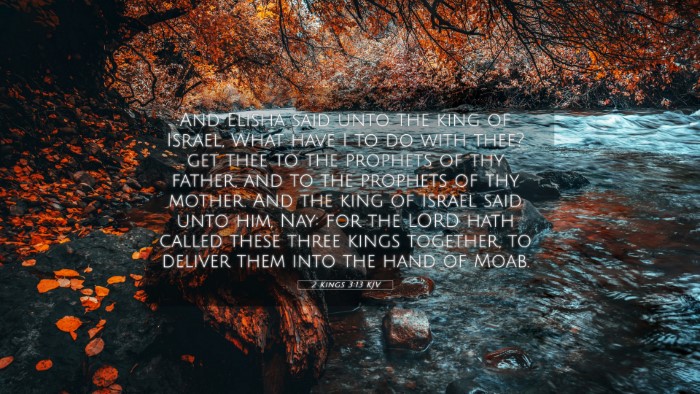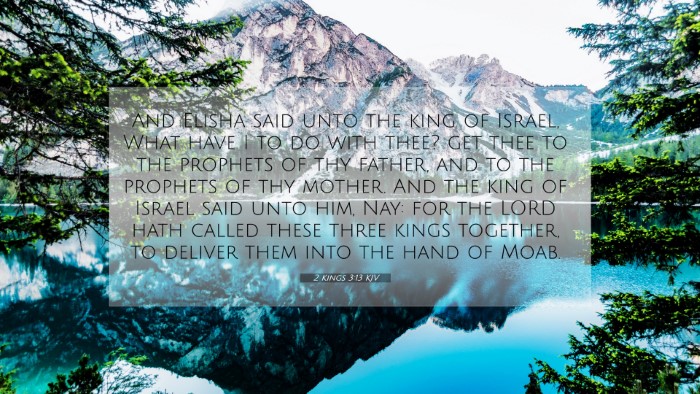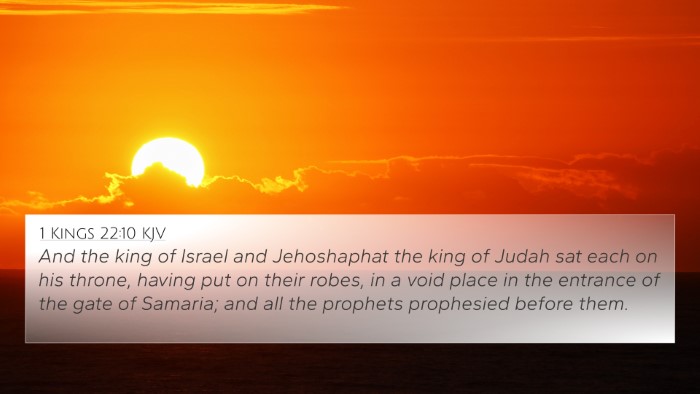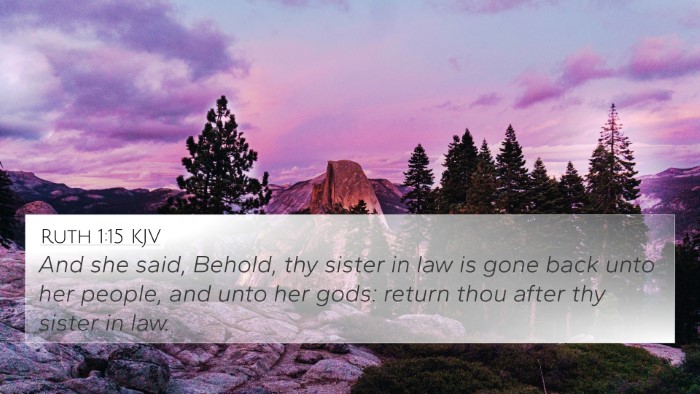Understanding 2 Kings 3:13
Verse: "And Elisha said unto the king of Israel, What have I to do with thee? get thee to the prophets of thy father, and to the prophets of thy mother. And the king of Israel said unto him, Nay: for the LORD hath called these three kings together to deliver them into the hand of Moab." (2 Kings 3:13, KJV)
Summary and Interpretation
This verse occurs in a context where three kings, including Jehoram of Israel, Jehoshaphat of Judah, and the king of Edom, are facing a crisis due to drought and impending battle against the Moabites. The prophet Elisha, representing God's voice, confronts Jehoram's lack of faith and reliance on foreign alliances rather than seeking God's direct guidance.
Insights from Commentaries
- Matthew Henry: Henry interprets Elisha's response as indicative of a deeper spiritual truth; the king of Israel was seeking help in a time of distress, yet he had initially turned away from God’s prophets. Henry emphasizes the importance of acknowledging one’s spiritual state before seeking divine intervention.
- Albert Barnes: Barnes expounds on the notion that the call from the king was not genuine, as he had previously rejected the prophetic voice of God during his reign. His insistence on seeking Elisha despite past transgressions highlights human inconsistency when faced with dire situations.
- Adam Clarke: Clarke notes the significance of the mention of the “prophets of thy father and mother,” illustrating that Jehoram’s lineage, particularly his evil upbringing, prevented him from genuinely seeking guidance from God. Clarke provides a detailed analysis of the prophetic tradition and how it can be neglected by those in power.
Bible Cross-References
- 1 Kings 22:7-9: Jehoshaphat’s inquiry into the prophets resonates with Elisha’s calling for spiritual counsel.
- 2 Kings 2:15: The recognition of Elisha’s prophetic authority reinforces the need to seek God through His appointed leaders.
- Isaiah 1:19-20: The invitation to receive God's instructions connects with the attitude of obedience portrayed in Elisha's reluctance.
- Jeremiah 27:9-10: A parallel can be drawn with the nations seeking false prophets over divine guidance under duress.
- James 1:5: This New Testament reminder of seeking wisdom from God ties back to the necessity of divine enlightenment during troubling times.
- 2 Chronicles 18:5: Jehoshaphat's experiences with false prophets provide a thematic connection to the reliance on true prophecy.
- Micah 3:6-7: These verses address the abandonment of true prophecy among leaders, which aligns with Elisha's confrontation.
- Proverbs 3:5-6: Trust in the Lord parallels the lesson being taught in 2 Kings about faithfulness to God’s ways.
- 2 Kings 3:8: This verse sets the stage for the kings' choices that led them to consult Elisha.
- Exodus 14:10-14: Like the Israelites, the kings are in a position of crisis, but they must learn to rely on God rather than their own understanding.
Thematic Connections
This verse illustrates the themes of faith, obedience, and divine guidance. Elisha’s response to King Jehoram serves as a reminder of the need for true repentance and reliance on God in contrast to seeking help from unreliable sources. It highlights the critical relationship between obedience to God's will and receiving His support in times of trouble.
Importance of Cross-Referencing Biblical Texts
Understanding Biblical verses like 2 Kings 3:13 is enhanced through the practice of cross-referencing. It allows one to see how various themes and lessons interweave throughout scripture, revealing deeper insights and enhancing one's understanding of God's overarching plan. Here are some methods and tools for cross-referencing:
- Bible Concordance: A tool to find scriptures that relate to certain words or themes.
- Bible Reference Resources: Utilize study Bibles that include cross-references for broader understanding.
- Comprehensive Bible Cross-Reference Materials: Guides and books specifically designed for cross-referencing different scriptures.
- Cross-Reference Bible Study Methods: Techniques for studying particular passages in relation to others for comparative analysis.
- Bible Chain References: A way to follow a logical sequence of verses connected by themes or words.
Conclusion
Embracing the lessons from 2 Kings 3:13 and related scriptures encourages believers to seek genuine divine guidance and foster a deeper relationship with God, using the tools of Bible cross-referencing to illuminate understanding and ensure compliance with His will. Realizing the interconnected nature of scripture enables a more profound grasp of spiritual truths and themes.


















